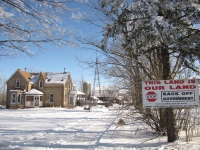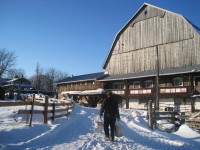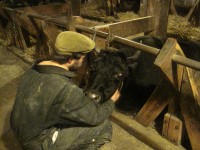Raw Revolution
 If you don’t know who Michael Schmidt is then allow me to introduce him and his farm, Glencolton Farms. Michael and his family immigrated to Canada from Germany in the early 1980s where they had run a profitable biodynamic, raw milk and cheese dairy. They settled on a farm out side of Durham, Ontario, two hours drive north west of Toronto. Michael, always partial to heritage breeds purchased his first Canadienne cows, the first milk cow introduced in North America, and began selling raw milk.
If you don’t know who Michael Schmidt is then allow me to introduce him and his farm, Glencolton Farms. Michael and his family immigrated to Canada from Germany in the early 1980s where they had run a profitable biodynamic, raw milk and cheese dairy. They settled on a farm out side of Durham, Ontario, two hours drive north west of Toronto. Michael, always partial to heritage breeds purchased his first Canadienne cows, the first milk cow introduced in North America, and began selling raw milk.
If you were to ask me just a few months ago what raw milk meant to me, I would have had little to say on the subject, which is a perfect indication of how well regulations and governing bodies have hidden the subject from the public eye. Dairy, like so many other sectors of modern agriculture has morphed in the last fifty years into an industrial production system that is so complex, and I would go so far as to say convoluted that when you buy a gallon of milk it is probably one to two weeks old, has traveled thousands of miles and contains milk from hundreds if not thousands of cows. What happened to getting milk from old Bessie out back?
Luis Pasteur and his process of Pasteurization made it all possible. It is once again a neat and tidy modern solution to a simple problem, which in turn creates more problems. Pasteurization has definitely saved the lives of many a milk drinking human in the last sixty or seventy years, but saved them from what? Milk is not an inherently dangerous substance; rather it is the level of care given to producing it that can cause a public heath hazard. In my opinion the sanitation standards for modern, industrial milk production are a threat to the health of the general public.
If you were to see the feces infested barns, jammed with Holstein cows drunk on antibiotics and corn silage you would agree that it is no place to grow food. And yet we do because we can. Pasteurization allows dairy sanitation standards to be so low, in fact it is almost assumed, which is why so many regulating bodies require pasteurization of milk. It’s a bit fishy if you think about it, can you imagine if your city told you the municipal water was unsafe to drink and that you should boil it or buy bottled water? So the industry implies that it is producing an unsafe product, but don’t worry they will sterilize it before it ever touches your lips.
So what’s wrong with sterile milk? At least you know that you are not going to get sick from it, right? That is up for debate. Michael Schmidt, and many others believe that raw milk is a completely different product and that people should have the right to choose which product they want to put into their bodies. In Ontario, like many other places in North America the consumer does not have that choice, and if they do buy raw milk their farmer is breaking the law. And that is exactly what Michael Schmidt has been doing for the last thirty years, breaking the law by producing pure, delicious raw milk for his loyal customers.
Michael, did however, quickly draw the attention of the government. In 1994 he was raided by provincial authorities and fined thousands of dollars for the illegal distribution of raw milk. They sold many of their cows to cover the cost of their losses and the farm was on the brink of collapse. Michael then started his Symphony in the Barn, found new inspiration in the music and the community, and began to rebuild his farm and cow heard. He realized that he could not fight this battle alone, and he began to involve the media and the public as well as his faithful base of supporters.
He changed the legal structure of the farm so that each customer would own a “share” in a cow, entitling them to a portion of the milk. And he openly challenged the law prohibiting the distribution and thus consumption of raw milk. He opened his operation to the complete scrutiny of government eyes and offered to be inspected tested randomly to prove if what he was producing was indeed a hazard.
In 2006 the farm was raided again, this time by armed guards. And this past Thursday, January 21st, 2010 Michael Schmidt, a raw milk dairy farmer with nineteen charges against him, including the distribution of raw milk, was delivered a verdict of not guilty of all nineteen charges.

I arrived at Glencolton Farm the day Michael was told the date of this decision. The court date was only two weeks off and the days that followed were as calm as one can be with an impeding verdict to decide if what you do on a daily basis is legal or not. On the morning of the trial we had chores as usual, starting at five in the morning, but all but two members of the farm left at seven to head down to the courthouse in New Market, ON. I was one of the two farm hands that stayed behind to await any government agents that might descend on the farm if a guilty verdict was found.
 The morning was both peaceful and anxious. Sunny skies, mild weather and melting icicles were punctuated by visions of armed men confiscating equipment and trucking away our beloved cows. The judge was due to read his verdict at nine A.M. and we waited, watching each passing car on concession 2 until quarter till twelve when we received a brief and ecstatic phone call: not guilty on all accounts! So we fed the cows their usual twelve o’clock hay, ate a leisurely lunch and took a nap to celebrate.
The morning was both peaceful and anxious. Sunny skies, mild weather and melting icicles were punctuated by visions of armed men confiscating equipment and trucking away our beloved cows. The judge was due to read his verdict at nine A.M. and we waited, watching each passing car on concession 2 until quarter till twelve when we received a brief and ecstatic phone call: not guilty on all accounts! So we fed the cows their usual twelve o’clock hay, ate a leisurely lunch and took a nap to celebrate.
When Michael returned to the farm with exhausted eyes and a smile from ear to ear he hugged us all and said, “it’s not over, now we can really get started: the revolution has begun.”
Apart from the momentous event that was the not guilty ruling this last Thursday I have been an active member of Glencolton Farm for almost three weeks now. While most of my mental energy has been spent absorbing the politics, policies and history of raw milk, my physical energy is routinely exhausted in the barn and in the cheese house.
 I am up at quarter to five, every morning for chores in the barn, then breakfast at eight thirty, next we have lots of miscellaneous jobs to do around the farm, including making cheese, yogurt, creme fresh, feeding the cows…etc. Then it is back in the barn at four to milk again and finish the evening chores. By nine I’m usually crawling up the stairs to my bedroom ready for sleep.
I am up at quarter to five, every morning for chores in the barn, then breakfast at eight thirty, next we have lots of miscellaneous jobs to do around the farm, including making cheese, yogurt, creme fresh, feeding the cows…etc. Then it is back in the barn at four to milk again and finish the evening chores. By nine I’m usually crawling up the stairs to my bedroom ready for sleep.
I will also report that there is no access to the internet on the farm. They have dial up in the office, which is how Michael sends his emails, but I don’t have a modem in my computer, and some days I just prefer to enjoy being back in the dark ages. Nevertheless, I hope to find time to post and communicate, and if not then I will post my writing when I am back at Meeting Place in April.
Didn’t expect less from you, Mr. Itinerant. Now I just hope you come back soon to explain me “The complete joy of home-cheesing”. First it was the bread, now it’s the beer, who knows if someday I’ll be making my own manchego!!
What’s that Barn Symphony and that inspiration found in the music? Would love to hear more about that.
Susu.
Beautiful to see that you are still writing.
🙂
This is not a matter of personal choice since pathogens that can be present in any raw milk cause transmissible diseases. He is putting all our children at risk by breaking the law.